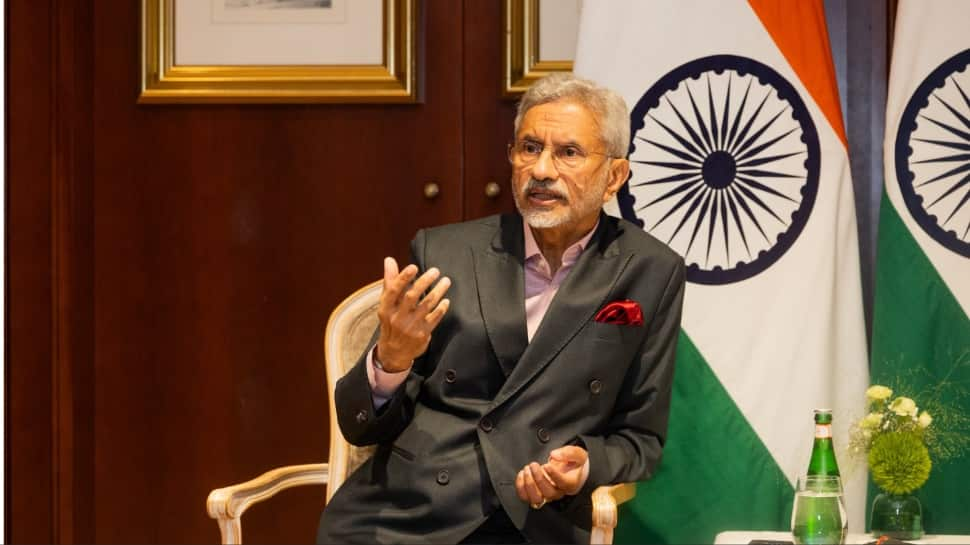New Delhi: External Affairs Minister, Dr S Jaishankar, has dismissed claims that the US played a crucial role in brokering the recent ceasefire between India and Pakistan. Instead, he credited India’s military actions for forcing Pakistan to agree to a halt in hostilities.
During an interview with the German newspaper Frankfurter Allgemeine Zeitung, Jaishankar made these remarks, stating that the ceasefire was agreed upon through direct contact between military commanders of both sides, following India’s effective strikes on Pakistan’s main airbases and air defense system.
He said, “The cessation of firing was agreed between the military commanders of both sides through direct contact. The morning before, we effectively hit and incapacitated Pakistan’s main airbases and air defence system. So, who should I thank for the cessation of hostilities? I thank the Indian military because it was the Indian military action that made Pakistan say: We are ready to stop.”
External Affairs Minister dismissed concerns that the India-Pakistan standoff during Operation Sindoor nearly escalated into a nuclear conflict, labeling such claims as “baseless and alarmist”.
He emphasized that India’s military actions, not external mediation, drove Pakistan to agree to a ceasefire. When asked how close the world was to nuclear war, Jaishankar replied, “Very, very far away. I’m frankly astonished by your question”
Dr S Jaishankar clarified that Operation Sindoor targeted terrorist hideouts in Pakistan with precise and controlled measures. After Pakistan’s military responded with fire, India demonstrated its capability to disable their air defense systems, leading to a ceasefire request from Pakistan.
He said, “We had terrorist targets. Those were very measured, carefully considered, and non-escalating steps. After that, the Pakistani military opened fire on us. We were able to show them that we could disable their air defence systems. Then the firing stopped at their request.”
Jaishankar criticized the West’s tendency to link South Asian conflicts to nuclear crises, calling it “disturbing” and highlighting that this narrative may inadvertently encourage terrorism. “Anything that happens in South Asia is promptly linked to a nuclear crisis by the West,” he said, calling the narrative “disturbing” and warning that it inadvertently “encourages terrible activities like terrorism”, Jaishankar added.
India and Pakistan agreed to a ceasefire on May 10, following three days of cross-border clashes. The conflict began when India conducted airstrikes on terrorist infrastructure in Pakistan and Pakistan-Occupied Kashmir on May 7, in response to the Pahalgam terror attack that killed 26 people.
Pakistan retaliated with drone attacks on Indian military installations and civilian areas, prompting India to target Pakistani military installations, causing significant damage. Shortly after, the Pakistani military reached out to their Indian counterparts, and a ceasefire was negotiated.
When asked about the proximity to nuclear conflict between India and Pakistan, External Affairs Minister S Jaishankar expressed astonishment, stating that the situation was “very, very far away” from such a scenario. He emphasized that India’s actions were targeted and measured, aimed at terrorist targets, and that Pakistan’s military response was met with a controlled counter-attack that disabled their air defense systems, leading to a ceasefire request.
Jaishankar criticized the Western narrative that South Asian conflicts inevitably lead to nuclear crises, noting that this perspective can inadvertently encourage terrorism.
“Very, very far away. I’m frankly astonished by your question. We have terrorist targets. Those were very measured, carefully considered, and non-escalating steps. After that, the Pakistani military opened fire on us. We were able to show them that we could disable their air defense systems. Then the firing stopped at their request. At no point was a nuclear level reached.”
“There is a narrative as if everything that happens in our part of the world leads directly to a nuclear problem. That disturbs me a lot because it encourages terrible activities like terrorism. If anything, much more is happening with the nuclear issue in your part of the world,” he replied.

